- Home
- Rick R. Reed
The Man From Milwaukee Page 12
The Man From Milwaukee Read online
Page 12
He showered three, sometimes four times a day.
He’d shaved his head and most of his body, to keep it clean, to remain pure.
So it wasn’t all that surprising that when he looked up, a little after his lunch of brown rice and kidney beans, that the day outside his windows looked summery, even though it was March, not a typically warm time for Chicago. Emory had expected to see gray skies, maybe raindrops on the glass. Lord, maybe even snow flurries.
Emory lingered on the view outside his windows, with its endless blue skies, broken up by a few puffy clouds high up. Because it was a Saturday, the kids were out of school and out in force along the sidewalks of Edgewater, playing hopscotch, jump rope, hide-and-seek, and riding bikes. Their voices carried, even though Emory’s windows were closed against winter’s chill.
He opened them now.
The warm air that wafted in was a shock. Even the breeze had lost its undercurrent of chill. It honestly felt more like June than March.
Emory had been promising himself he’d begin a running regimen as soon as the weather got warm enough for it to be bearable along the lakefront trails.
No time like the present, Emory told himself. His weight had dropped over the winter, but he liked being skinny and seeing his ribs. It made him feel clean, like his body was an efficient tool, burning away all his fat reserves until what remained was a pristine machine, glorious.
He thought of Tyler often and wondered what he was doing, if he still worked downtown at their mutual once-upon-a-time place of employment.
In his darkest hours, he imagined Tyler in the arms of another man. The nasty images that rose up made Emory run to the bathroom and puke up whatever meager food he’d consumed. He had to force thoughts of Tyler away as much as possible. But here was the conundrum—the harder he tried not to think of Tyler, the more he did.
Emory went into his room and dug out a pair of old gray sweatpants and a long-sleeved T-shirt. Even though the sun’s brilliance promised balmy temperatures, he knew that along Lake Michigan it would still be chilly. That huge body of roiling blue/gray water held ice in its makeup, and Emory knew it would be more than happy to share that coldness with him.
Once his running shoes were laced up and tied, he set out.
*
Night.
Emory was restless. He found he couldn’t sit still—not to read, not to watch TV, not to eat, and certainly not to be alone with his own thoughts.
He’d had so little contact with anyone over the past few months. He needed to get out, if not to mingle with people, to at least be among them.
Jeff had once told him that he needed this interaction, this rubbing shoulders and elbows with his fellow humans. It was natural. People were designed to connect. Emory didn’t quite understand why Jeff held this view since the serial killer seemed to hate most folks, himself in particular. But maybe he was trying to make Emory a better person than he was. Perhaps he recognized a kind of salvation through improving Emory’s lot since it was now much too late to better his own.
So, Emory showered and dressed. He was ready to go out around nine o’clock, a time when he’d normally slide between his flannel sheets.
He took a look at himself in the mirror hanging on the back of his closet door. At first, he jumped, because there Mother stood behind him in the mirror. Her head cocked, she smiled. Love, rather than sickness, radiated from her eyes. She reached out a hand, as though to smooth his hair or brush a stray piece of lint off his shoulder.
But when he whirled around, fully expecting her to be there even though his rational mind was screaming that it couldn’t be so, the empty room mocked him. When he turned back to the silver glass again, only his own reflection looked back.
Seeing now through Mother’s eyes, he barely recognized himself. When he’d quit his job last winter, he was a completely different person. He had a spare tire around his waist. His hair was a dingy shade of mouse brown. His shoulders, hunched, told a tale of a person who wanted to be invisible.
Now, though, in his button-fly Levi’s and heather gray T-shirt, he was transformed. He stood tall, accentuating his much leaner frame. The shaving of his head made his eyes appear larger, more luminescent. The shearing of hair, rather than making him appear a victim of male-pattern baldness, gave him a more manly, confident look—as though he were telling the world he was comfortable and confident in his own skin.
Even if he wasn’t.
Mother had always said to act the part and the part would become you.
He pulled a blue fleece jacket from the closet because, once the sun went down, March chill had risen back up, accompanied by a misty precipitation that shrouded the streets outside in fog, creating halos around the light from the streetlamps.
Spring was always a flighty, fickle bitch.
He avoided the elevator and hurried down the flight of stairs that would take him to the lobby. Once there, he paused in the vestibule, pacing for a moment outside the banks of silver metal mailboxes that lined one wall. Of course, he’d checked the mail earlier, on his way back from his run, in fact. And all that was in the mailbox was the usual blend of solicitations and demands for money.
No letter from Jeff. Just like every day…
But something, a pleading little voice, told him to check the mailbox one more time. He’d never known there to be a second mail delivery before, but he felt compelled to grope for his keys and then use the one that would open the mailbox’s little door.
Inside, there was a letter.
He pulled it out cautiously, as though it were flammable, and gasped when he saw it was from Jeffrey.
Going out would have to wait. Emory turned on his heel and rushed back upstairs.
Once in the apartment, he switched on the brass table lamp next to the couch and plopped down with the missive. With trembling hands, he tore the envelope open.
Dear Emory,
Almost a month has passed now since my sentencing. It’s unreal to imagine that I now have to give up five consecutive lifetimes to pay for my crimes. Even cats have only nine lives. Where am I going to get five to pay for what I did?
Not your worry, my friend. Not your worry.
I know I’ll be here for the remainder of my days, however long that turns out to be. The worst part is not the sentence, or that I will never again know what it’s like to simply be free, to go to a grocery store and buy food, to see a movie at the local show, to sit on a bar stool and have a beer.
Life, as I once knew it, is over.
I can accept that. What I can’t accept is the shadow of fear that dogs me now.
The other guys in here? Every one of them hates me with a passion even I, the infamous and depraved serial killer, can’t imagine.
Emory, one day they will kill me. Mark my words.
I just don’t want it to hurt. I look forward to escaping this world, but I don’t want to have to go in terror and in pain.
You’re thinking, and rightly so, I dispatched my own victims with terror and pain accompanying them. But that’s not true. I tried to be kind to them, even as I was killing them. I always wanted their deaths to be kind of soft surrenders, a giving up of the suit of clothes they wore as men, releasing their spirits.
Does that sound too woo-woo spiritual for you? It was true.
I hope none of the men I loved (and I loved every one of them, even as the life ebbed out of them while they were in my arms) suffered.
You have to live for me, Emory. Be the man I always wanted to be. A man who loves himself first so others can love him back.
Get Tyler back.
Keep him with you.
Jeff
Emory stared down at the scrawled handwriting, the scratched-out words, the blot of ink that perhaps was made by a fallen tear. It was one of the clearest letters Jeff had ever written him as well as one of the longest. Emory worried about him, alone in his cell, afraid that someone would take something sharp to him, or worse, beat him to death with fists. Maybe
he’d be strangled after being raped. Maybe the latter had already happened.
Emory put his head against the back of the couch.
There was nothing he could do for Jeff in prison. Maybe someday, if he could get up the nerve, he’d visit him there. It wasn’t all that far away. And he was sure Jeff would put him on an approved visitor’s list if there was a need for it.
But for now, he needed only to do what Jeff had asked: live for him. And, Emory hastened to think, live for myself.
He’d make sure Tyler knew, without a doubt, there was no other man that could love him as Emory could. No one would adore him more.
Eyes shut, he allowed himself a brief imagining—Tyler curled up beside him on this very couch, the flickering light of an old horror movie, something like The Last House on the Left, flickering over the both of them. Spilled popcorn on the couch, their skin just touching.
Bed later, awakening in the other’s arms, the sheets warm from the sun and their own bodies. Breakfast in the morning.
A whole life together.
He opened his eyes at last and stood.
What does the night hold?
*
As he was walking to the Granville L stop, he passed the Forge as the door to the bar opened. On a wave of stale beer and smoke, a pair of younger guys, their arms wrapped around each other, staggered out, laughing. “Hey, you wanna three-way?” one of them called to Emory, which caused them to laugh even harder.
Emory tried to peer into the bar before the door slammed shut again, but all he saw were shadows. He shivered as he thought of the bartender who was murdered the night he was last in here (the only time he’d ever been in the Forge) and wondered why that night remained a large black and blank spot in his memory.
Did I kill him? Could I have?
He knew he probably had, in a bizarre sort of homage to Dahmer, in a supreme act of self-loathing. But yet, there was the uncertainty. If only he could remember…
He paused and watched the two young men, one with a shaved head like Emory’s own and the other a redhead with a big gut and a beard, head east, toward the lakefront. One of them, he guessed, had an apartment in one of those high-rises lining Sheridan Road.
He shook his head to free it from the pornographic images that arose. They fled once the pair rounded the corner on Sheridan, headed south.
What do I care what they get up to?
Tonight, he would brave the Saturday night crowds on Halsted and go to one of the busiest establishments along the strip, Sidetrack. He’d never been, but he’d heard it was some sort of video bar, with screens all over the place. From what he’d read in one of the gay rags, they showed all sorts of stuff—old TV sitcoms, Broadway musicals, maybe even softcore porn. The notion of this last option caused a kind of weird queasiness to rise in his gut—delightful and paradoxically revolting, all at the same time.
Emory didn’t know how interested he was in watching anything, but he figured the screens would give him a place to focus his gaze. He’d be alone, but he’d be doing something. He could be out among people without being too obvious, he thought, as he slouched against a wall, with a bottle of beer clutched in his hand.
He wanted to be part of a crowd.
He also wanted to be invisible.
During the walk from the Addison stop, he nearly changed his mind several times. He got a lot of stares, mostly from the gay men he encountered in the busy Wrigleyville neighborhood, some even swiveling their heads to take him in approaching and walking away. He wasn’t flattered. All the attention did was to make his face burn.
Was he suddenly visible, maybe even attractive?
He shook his head. Impossible.
*
Sidetrack was packed. Emory stood for a moment, frozen, in the doorway, just before the guy on a stool, checking IDs. He didn’t move until someone behind him called, “Dude. You going in?”
Emory turned to look at a kid, really. If he was even in his early twenties, Emory would have been surprised. He had black hair and eyes to match. He used those eyes to shoot impatient daggers. “Goin’ in or what? Tonight would be nice.”
“Give me a second, please. Just getting my wallet.” Emory moved forward, his driver’s license out for the doorman’s inspection with the flashlight he held.
The doorman ran the beam of the flashlight over Emory’s ID and handed it back without even a glance at his face.
Emory walked the few steps it took to get inside the bar proper.
Even though the main room of Sidetrack was crowded with wall-to-wall people, Emory had never felt more alone in his life. Despite speakers blaring dialogue from a sitcom and the voices in the room shouting to be heard overtop the canned laughter, the party atmosphere was lost on Emory. Truly, he was a stranger in a strange land.
You’re here now, a voice in the back of his mind told him, a voice that sounded much like what he imagined Jeffrey Dahmer to sound like, you might as well make the best of it. Who knows? Maybe if you ease up just a little and quit being so self-conscious you might even enjoy yourself.
“Oh, what do you know?” Emory said aloud, earning him a look from a bespectacled guy standing near the entrance, sipping something red from a martini glass. A little swirl of lemon peel moved in the drink like a fish.
“What?” he asked. A little smile played about his lips as if he were missing out on whatever joke he was supposed to get.
“Oh, nothing,” Emory said. “I was just thinking out loud.”
“Sounded more like you were arguing with someone.” He raised his eyebrows above the rims of the little round gold frames of his glasses. And then he grinned, and in that grin, Emory found comfort.
He’s not laughing at you. Say something.
Emory pointed to the guy’s glass. “What’s that you’re drinking?”
He glanced at his glass, which prompted him to take a sip. “It’s something new. Called a Cosmopolitan.”
Gravely, Emory nodded. “What’s in it?”
“Damned if I know. Fairy dust, snips and snails, and puppy dog tails.” He laughed. “I can tell you there’s vodka and cranberry for sure.” He took another sip. “Maybe lime or lemon?” He drained the glass and peered at it curiously. “Guess it’s time for another.” He cocked his head and Emory thought, for a moment, that he would offer to buy him one. “You should try one.”
He walked away and left Emory in a sea of people, where he imagined himself as some kind of buoy, bobbing on drunken waters.
Emory moved along the side of the bar, keeping close to the wall. He found a corner where no one stood and took up his place there. The only problem was he’d have to give it up to go get a drink. By the time he came back, the spot would undoubtedly be gone.
Emory was never much of a drinker anyway. He’d just stand here and watch, see what the natives did. Maybe he’d learn something.
A clip from the old TV sitcom Maude came on, and it caught Emory’s attention, not because he’d loved the show (even though he would admit, if only to himself, that he knew every word of the theme song), but because it released a memory. His mother, long before she was sick, belonged to a Tuesday night bowling league, and while she was out at the Head Pin, over on Broadway, he’d babysit Mary Helen. They’d loll on the living room floor and watch TV until Mother came home, often sharing a box of powdered sugar doughnuts, which they’d dunk into mugs of milk. They’d stay up, in their pajamas, until Mother came home, usually around the time the news made its ten o’clock appearance.
“Nice to see you smile.”
The voice drew him out of his reverie, and he had to refocus away from one of the big monitors above him to see who’d spoken.
When he did, his mouth dropped open. “Tyler?”
It was like waking from a dream.
But there he was, standing right in front of him, holding a tall glass of what Emory assumed was vodka and tonic. It looked refreshing, bubbling, with a lime wedge floating on the surface.
Tyler smi
led broader. “In the flesh.”
He looked no different. The same blond hair, a lock of which now fell over his forehead, obscuring part of his left eye. He may have even gained a bit of weight—he seemed stockier and more substantial. His grin melted Emory’s heart. Until this moment, Emory hadn’t realized how much he’d missed him even though he’d thought of him almost every day over the past few months.
Emory mumbled, “You look good.”
“Thanks. And you? Emory…you’ve really changed. I almost didn’t recognize you. But then I saw that telltale faraway look in your eyes, and I said, ‘That’s my old friend.’”
Emory didn’t know whether he was happy or sad to be described as a friend. On the one hand, “He still thinks of me as a friend,” and on the other, “Only a friend.” How do I reconcile?
“Yeah, it’s me,” Emory said.
“You look good, man. Slimmed down…and mean!” Tyler laughed, but in a sexy way. “Did you find another job?”
Emory shook his head. “Nah. I’m either overqualified or underqualified for everything, seems like. You still at Quality?”
“Nope. Got out of there shortly after you left.” Tyler grinned. “I got an editor gig at one of the magazines at the American Medical Association over on Grand Avenue.”
“You like it?”
Tyler shrugged, took a sip of his drink. “It’s a little boring, honestly. But it pays pretty well, and I have my own office, so that’s cool.”
Emory didn’t know what to say. He glanced down at the floor, noticing the cigarette butts and the grit. When he looked up, Tyler had moved a few steps away. “It was nice seeing you, Emory. I got to get back to my friend.”
“Okay.” Emory watched him walk away, disappearing into the crowd and then re-emerging near the bar. A big guy in a green-and-black-flannel shirt with a stubbly beard and a buzz cut grabbed Tyler and squeezed him, planting a peck on his lips.
As he did it, a wave of laughter erupted in the place in response to a clip from America’s Funniest Home Videos, but it felt to Emory as though they were laughing at him.
For being such a fool.

 Big Love
Big Love Blue Umbrella Sky
Blue Umbrella Sky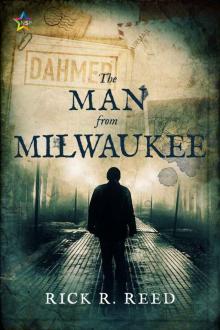 The Man From Milwaukee
The Man From Milwaukee Unraveling
Unraveling Penance
Penance Husband Hunters
Husband Hunters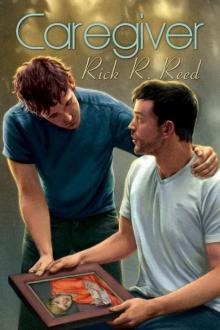 Caregiver
Caregiver Superstar
Superstar Beau and the Beast
Beau and the Beast Obsessed
Obsessed Bigger Love
Bigger Love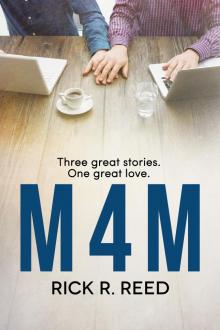 M4M
M4M I Heart Boston Terriers
I Heart Boston Terriers Dinner at Jack's
Dinner at Jack's A Dangerous Game
A Dangerous Game An Open Window
An Open Window Dinner at Fiorello’s
Dinner at Fiorello’s The Perils of Intimacy
The Perils of Intimacy Orientation
Orientation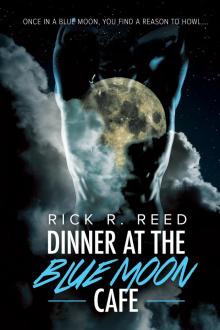 Dinner at the Blue Moon Cafe
Dinner at the Blue Moon Cafe High Risk
High Risk Sky Full of Mysteries
Sky Full of Mysteries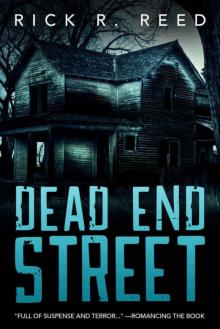 Dead End Street
Dead End Street Crime Scene
Crime Scene Fugue
Fugue Blink
Blink Lost and Found
Lost and Found